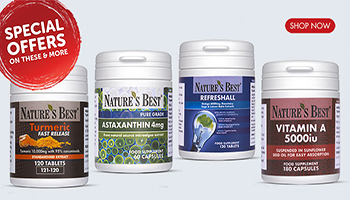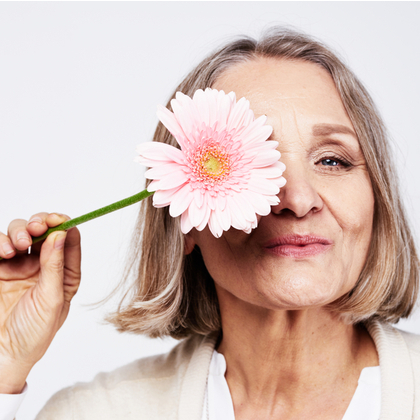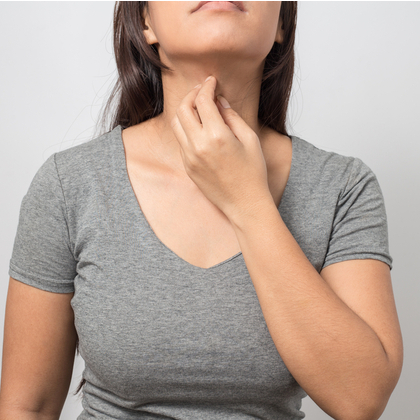
Experiencing skin changes throughout the menopausal transition is a common symptom. As you enter perimenopause, oestrogen, a well-established skin-protective hormone, starts to fall and can lead to changes, including wrinkles, fine lines, sagging and dehydration.
In contrast, your androgens, (which are known to cause adult acne) remain the same.
Some women notice changes overnight, but for others, these happen more gradually.
What are some possible changes to my skin?
Skin thinning and elasticity

Collagen is the most abundant structural protein in the skin, helping to maintain firmness and elasticity (1). A woman may lose up to 30 per cent of collagen in the first five years after menopause (2). This natural decrease in collagen, combined with the fall of oestrogen in menopause, accelerates skin ageing.
Fine lines and wrinkles
In menopause, many women experience a reduction in their skin’s elastic fibres and glycosaminoglycans (GAGs), structural components in collagen, due to the sharp drop in oestrogen. Elastic fibres and GAGs are responsible for making your skin bouncy and plump. When these decrease, facial lines, creases, and wrinkles become more pronounced.
There is no denying that changes to your appearance can be both distressing and uncomfortable. However, there are many simple interventions, from supplements to skincare, to support your complexion as you navigate the menopause.
How can I improve my skin during menopause?
Peptides
Peptides are powerful amino acids that provide the building blocks for proteins, like collagen. Incorporating a peptide-packed serum or moisturiser in your skincare regime may help to revitalise your complexion (3).
Anthocyanidins
Anthocyanidins are potent antioxidants found in the blue and red pigments of dark-skinned fruit, berries and seeds. These plant compounds are believed to preserve and protect the body’s natural collagen, thereby supporting the overall health and appearance of skin. In particular, anthocyanidins support the reduction of UV skin damage – the most notable accelerator of skin ageing – by neutralising highly reactive molecules called free radicals (4).
With this in mind, you may consider taking Colladeen Visage, which boasts levels of anthocyanidins that are unparalleled by any other nutritional supplement in the UK. Besides anthocyanidins, this product also provides the additional skin-loving nutrients, green tea, lutein, vitamin C and biotin.
Sea buckthorn berry oil
Sea Buckthorn Berry is rich in both antioxidants and omega-7 fatty acids, making it the perfect addition to your skincare regime. There is some evidence to suggest that this plant may help to reduce skin dryness – a common menopausal complaint – and promote elasticity (5).
Topical retinoids
A derivative of vitamin A, retinol is considered one of the best anti-ageing treatments available. It stimulates collagen production, maintains skin plumpness, and supports the reduction of wrinkles (5). However, retinoids can dehydrate the skin initially, so it is vital to increase your usage gradually.
Topical vitamin C
Topical vitamin C is another helpful tool for your skin. This compound protects against and reduces free radical damage from sun exposure, pollution and stress, leaving your complexion bright and glowing (6).
Chemical peels
You may also benefit from using an at-home skin peel with alpha hydroxyl acids (AHAs), such as glycolic or salicylic acid, once or twice a week. These chemicals are known to exfoliate and brighten the skin, reducing fine lines and wrinkles.
SPF
Since 90 per cent of wrinkles are caused by sun exposure, practising good sun protection may help prevent any future skin damage. To safeguard your skin, wear a broad-spectrum sun cream with at least 30 SPF daily. Besides topical sun cream, Colladeen Visage has also been shown to build an internal SPF of 10 in just 12 weeks.
Menopausal acne
Acne is most likely to occur in perimenopause. For some women, acne may continue in their 50s, 60s, or 70s.
Hormonal imbalances are often behind menopausal acne. As you approach menopause, there’s a gradual decline in circulating oestrogen even though your androgen levels remain the same (7). Androgens (your male hormones) stimulate the skin’s hair follicles and skin’s oil glands; overstimulation can lead to acne.
Cleanse thoroughly
A quality cleanser with alpha hydroxyl acids (AHAs), such as salicylic or glycolic acid, may help to exfoliate the skin and unclog pores. Try cleansing your face twice every night; this will thoroughly remove make-up, dirt, and excess oils from the day. Always follow this routine with a moisturiser.
Topical retinoids
Retinoids have demonstrated promise at improving acne (8). A retinoid moisturiser or serum opens pores, thereby preventing breakouts. However, topical retinoids can be harsh on the skin and, in some cases, may cause it to flake. With this in mind, always start using the product a few times a week and build up gradually.
Zinc
Zinc is often recommended for a healthy complexion (9). You may benefit from supplementing with 15mg daily.
Dehydration
Dry skin is one of the most common skin complaints in menopause. In a study of 3975 postmenopausal women, 36 per cent said they experienced dehydrated skin.10 Extreme dehydration can even lead to skin itching (pruritus).
Learn more about soothing itchy skin in menopause here.
Hyaluronic acid
Naturally produced in our bodies, hyaluronic acid is known for its impressive moisture-retaining properties (11). Hyaluronic acid production declines with age, so using serums and moisturisers containing this chemical will help rehydrate your skin. Using moisturiser liberally will also keep your skin supple and hydrated.
To learn more about supporting your health in menopause, please visit the rest of our Menopause hub.
References:
-
Shoulders. MD., Raines RT., Collagen structure and stability. Annual review of biochemistry. 2009;78:929-958.
-
Calleja-Agius. J., Brincat M., The effect of menopause on the skin and other connective tissues. Gynecological Endocrinology. 2017;28(4):273-77.
-
Jeong S. et al., Anti-Wrinkle Benefits of Peptides Complex Stimulating Skin Basement Membrane Proteins Expression. International journal of molecular sciences. 2019;21(1):73.
-
Wang. LS., Stoner GD., Anthocyanins and their role in cancer prevention. Cancer Lett. 2008;269(2):281-90.
-
Zieli?ska . A., Nowak I., Abundance of active ingredients in sea-buckthorn oil. Lipids in health and disease. Cancer Lett. 2017;16(1):95.
-
Varani J. et al., Vitamin A antagonizes decreased cell growth and elevated collagen-degrading matrix metalloproteinases and stimulates collagen accumulation in naturally aged human skin. J Invest Dermatol. 2000;114:480-6.
-
Pullar J.M. et al., The Roles of Vitamin C in Skin Health. Nutrients. 2017;9(8):866.
-
Varani J. et al., Vitamin A antagonizes decreased cell growth and elevated collagen-degrading matrix metalloproteinases and stimulates collagen accumulation in naturally aged human skin. J Invest Dermatol. 2000;114:480-6.
-
Pullar J.M. et al., The Roles of Vitamin C in Skin Health. Nutrients. 2017;9(8):866.
-
Meisler J. Toward Optimal Health: The Experts Discuss Facial Skin and Related Concerns in Women. Journal of Women's Health. 2003;12(6):533-539.
-
Webster G.F. et al., A multicenter, double-blind, randomized comparison study of the efficacy and tolerability of once-daily tazarotene 0.1% gel and adapalene 0.1% gel for the treatment of facial acne vulgaris. Cutis. 2002;69(4):4-11.
-
Gupta M. et al., Zinc therapy in dermatology: a review. Dermatology research and practice. 2014;709152.
-
Calleja-Agius. J., Brincat M., The effect of menopause on the skin and other connective tissues. Gynecological Endocrinology. 2017;28(4):273-77.
-
Papakonstantinou. E, Roth. M, Karakiulakis. G. Hyaluronic acid: A key molecule in skin aging. Dermato-endocrinology. 2012;4(3):253-258.
You Might Also Like
Disclaimer: The information presented by Nature's Best is for informational purposes only. It is based on scientific studies (human, animal, or in vitro), clinical experience, or traditional usage as cited in each article. The results reported may not necessarily occur in all individuals. Self-treatment is not recommended for life-threatening conditions that require medical treatment under a doctor's care. For many of the conditions discussed, treatment with prescription or over the counter medication is also available. Consult your doctor, practitioner, and/or pharmacist for any health problem and before using any supplements or before making any changes in prescribed medications.

Olivia
Olivia Salter has always been an avid health nut. After graduating from the University of Bristol, she began working for a nutritional consultancy where she discovered her passion for all things wellness-related. There, she executed much of the company’s content marketing strategy and found her niche in health writing, publishing articles in Women’s Health, Mind Body Green, Thrive and Psychologies.
View More



